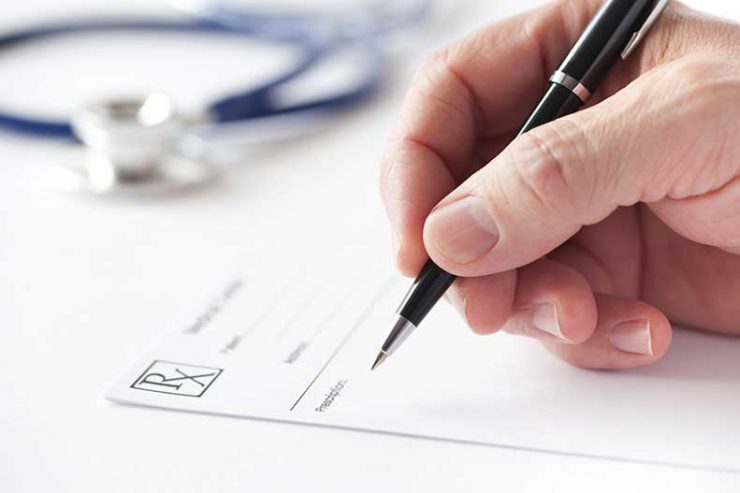If you have high blood pressure, your doctor might prescribe medicine to keep it in a healthy range. Learn the facts about blood pressure medication, including potential side effects, and how to take your medicine safely.
Never Miss a Beat!
Subscribe to Our HealthBeat Newsletter!
Thank you for subscribing!
You can now select the specific newsletters you'd like to receive.
You are already subscribed.
Subscribe to more newsletters in our email preference center.
Sorry, an error occurred. Please try again later.
Get Healthy Tips Sent to Your Phone!
What Is High Blood Pressure?
When your heart beats, it pushes blood out into your blood vessels. Your blood pressure is the amount of force that your blood exerts on your blood vessels.
If you have high blood pressure, your blood pushes against your blood vessels with too much force. Over time, this can lead to serious health problems like heart disease and stroke.
Normal vs. High Blood Pressure
Blood pressure is shown in two numbers: systolic and diastolic.
The systolic number measures the pressure of your blood in your blood vessels when the heart beats. The diastolic number measures the pressure of your blood in your blood vessels when the heart rests between beats. For example, a blood pressure reading would be 120/80.
- If your blood pressure is 120/80 mmHg most of the time, it is considered normal.
- If your blood pressure is above 120/80 but below 140/90 most of the time, it is considered pre-hypertension
- If your blood pressure is 140/90 or higher most of the time, it is considered high blood pressure, also known as hypertension
What Medicines Treat High Blood Pressure?
Your doctor will recommend treatment based on your:
- Medical history
- Lifestyle
- Family history
In addition to lifestyle changes, like eating a heart-healthy diet, getting regular exercise, quitting smoking, and learning healthy ways to cope with stress, your doctor might prescribe medicine to get your blood pressure into a healthy range.
Many types of medicines treat high blood pressure, and it’s not unusual for someone to take two or three medicines in combination. Some of the most commonly prescribed medicines include:
- Diuretics, which help remove extra sodium and water from your body. These medicines are usually used in combination with others.
- Beta blockers, which help your heart beat slower and with less force.
- Angiotensin-converting enzyme inhibitors (ACE inhibitors), which lower the amount of a certain hormone and enzyme in your body that narrows your blood vessels.
- Angiotensin II receptor blockers (ARBs), which work similarly to ACE inhibitors.
- Calcium channel blockers, which keep calcium from entering cells and helps the heart pump with less force.
Less common blood pressure medicines include:
- Alpha blockers, which help relax your blood vessels.
- Centrally acting drugs, which help your brain and nervous system to relax your blood vessels.
- Asodilators, which help your blood vessel walls relax.
Blood Pressure Medicine Side Effects
Many medicines have side effects, and most will go away over time. Some of the most common side effects of high blood pressure medications include:
- Skin rash
- Nausea or vomiting
- Anxiety
- Dizziness or light-headedness
- Coughing
- Diarrhea or constipation
- Feeling tired, weak, or like you have no energy
- Headache
If you’re struggling with side effects, talk to your doctor. In some cases, changing the dose or the time of day you take the medicine can help.
Staying safe while using blood pressure medicines
If your doctor recommends blood pressure medication, make sure that you:
- Tell your doctor about all of the other medicines, vitamins, minerals, and supplements you take. This can help your doctor figure out what is safe for you.
- Ask your doctor what to do if you need to take an over-the-counter (OTC) medication, like aspirin, allergy medicine, or cold medicine. Some OTC drugs are not safe for people with high blood pressure.
- Find out about the side effects of your prescribed medicine and what to do if you have them.
- Never stop taking your medicine or change the dose without talking to your doctor first.
Visit the UPMC Heart and Vascular Institute or call 1-855-UPMC-HVI to learn more.
About Heart and Vascular Institute
The UPMC Heart and Vascular Institute has long been a leader in cardiovascular care, with a rich history in clinical research and innovation. As one of the first heart transplant centers in the country and as the developer of one of the first heart-assist devices, UPMC has contributed to advancing the field of cardiovascular medicine. We strive to provide the most advanced, cutting-edge care for our patients, treating both common and complex conditions. We also offer services that seek to improve the health of our communities, including heart screenings, free clinics, and heart health education. Find an expert near you.
